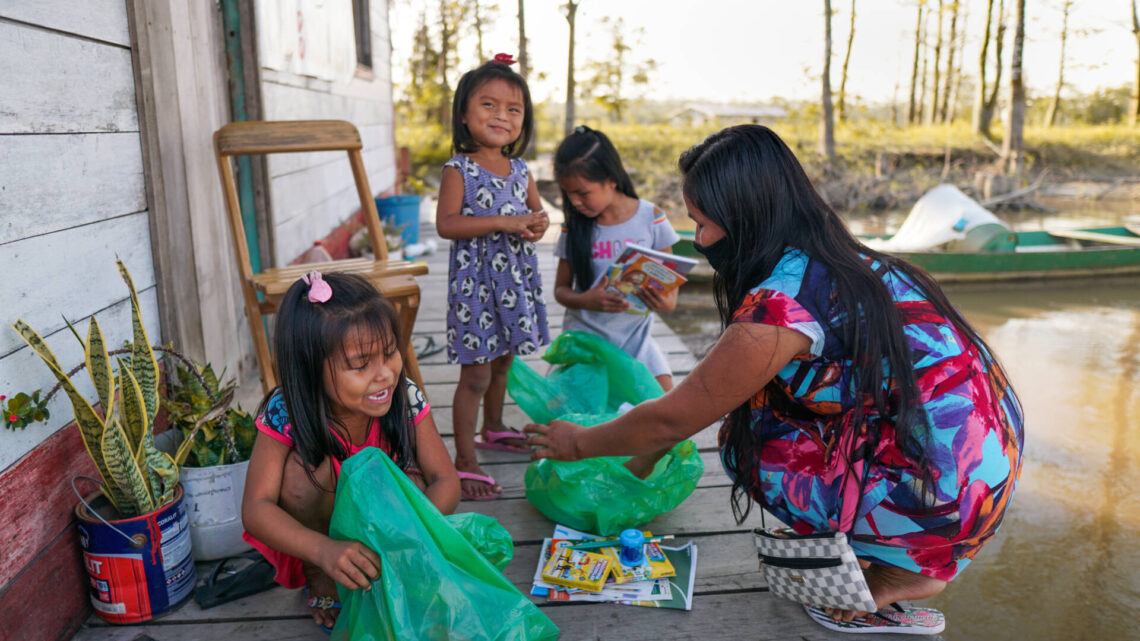Responding to COVID-19 in one of the most remote places

The Amazon River teems with life. Its vast network of tributaries nourishes a complex and delicate ecosystem. Among the millions of people who live here are Indigenous families who draw sustenance from the water that also brings outside travelers — and with them, the coronavirus.
As COVID-19 cases increased along the Amazon, so did fears about loss of life. The speed with which the virus has traveled into remote communities was no match for the fastest vessels delivering supplies. “We are seeing deaths increasing. There is a lot of suffering, a lot of pain and many tears,” says Pastor Francisco Chaves dos Santos of Presbyterian Church of Manaus in Manaus, Brazil. The church has partnered with World Vision for 15 years to help vulnerable communities. “We are seeing people in need like we have never seen them before.”
In Brazil, the pandemic has exacted its toll with more than 142,000 deaths and 4.7 million cases. “If we don’t have a resource, to believe in God is all that remains for us,” says Lourdes, a 49-year-old mother living in São José, a riverside village two hours away from the nearest city. A diabetic, Lourdes needs medicine. And a foot injury during the pandemic has confined her to a hammock. Lourdes’ way out of her misery is prayer. “My God,” she pleaded. “I hope that one day, one day I will see a motorboat.”
Ferrying in hope is a team of healthcare workers and volunteers aboard a medical ship called the Solidarity, operated by World Vision. Volunteers, medical crew become a healing force for families The Solidarity has sailed to isolated communities to deliver food boxes, issue essential first-aid supplies, and provide medical care to 1,000 families in Brazil hit hard by the pandemic. A doctor, two dentists, two nursing technicians, and a chief nurse are among the Solidarity’s crew. They have distributed 1,400 food boxes, 800 hygiene kits, 400 Tenderness Boxes, and 2,100 masks to families in Brazil.
“We are reaching populations in extreme vulnerability due to the limited access to health services, medicines, geographic isolation, and communication difficulties,” says Martha Yaneth Rodriguez, national director of World Vision in Brazil. Social isolation and increased economic vulnerability are putting children and youth at increased risk of abuse, violence, dropping out of school, and food insecurity, she says. It’s also more difficult for them to access health services. For many children, it was their first health checkup. “In the riverside community, people don’t see a dentist regularly, or many of them have never seen a dentist before. They suffer a lot from cavities, especially children,” says Djalison do Nascimento Rodrigues, a dentist aboard the Solidarity.
Donations, food, and smiles for Célia and her three daughters Célia, a 29-year-old mother of three daughters ages 9, 6, and 3, says she could not express her gratitude enough for the aid her family received. “For us, everything changed with the pandemic,” says Célia. She and her husband live on the outskirts of São José. They rely on crops for income. When the pandemic hit, they had no crops to plant for a future opportunity to reap a harvest. “And if we don’t have money, we have nowhere to get it to have food for our daughters,” Célia says. “In times of difficulty, having something to eat is the number one priority of every riverside family. In those times … oral hygiene and children’s education ends up neglected.” Célia’s daughters were elated to receive school supplies and dental hygiene essentials. The three sisters also learned how to care for their teeth.
“You arrived on time and at the right time, sent by God, because God knows the needs of each family. This help came at the right time for us.” Lourdes says the Lord answered her prayers When the medical team pulled ashore to her village. The ship’s doctor and nurse treated Lourdes’ injuries and diabetes during a house call. ” “I prayed and asked God that one day this boat would arrive in our community. And now you are here.
Hanna, one of the children, shared: “I like the Tenderness Box because it comes with sketchbooks and school supplies. It’s important because here, we have no money, and you come, and you give.” “I thank you very much for the food basket that you delivered to each family, this is very important,” says Marcelo, a father. “We feel so loved.”